Community support plays a crucial role in enhancing wellness journeys by offering emotional encouragement, motivation, and access to valuable resources. By engaging with supportive networks, individuals can improve their mental health, stay committed to their personal goals, and benefit from shared knowledge that promotes growth and well-being.
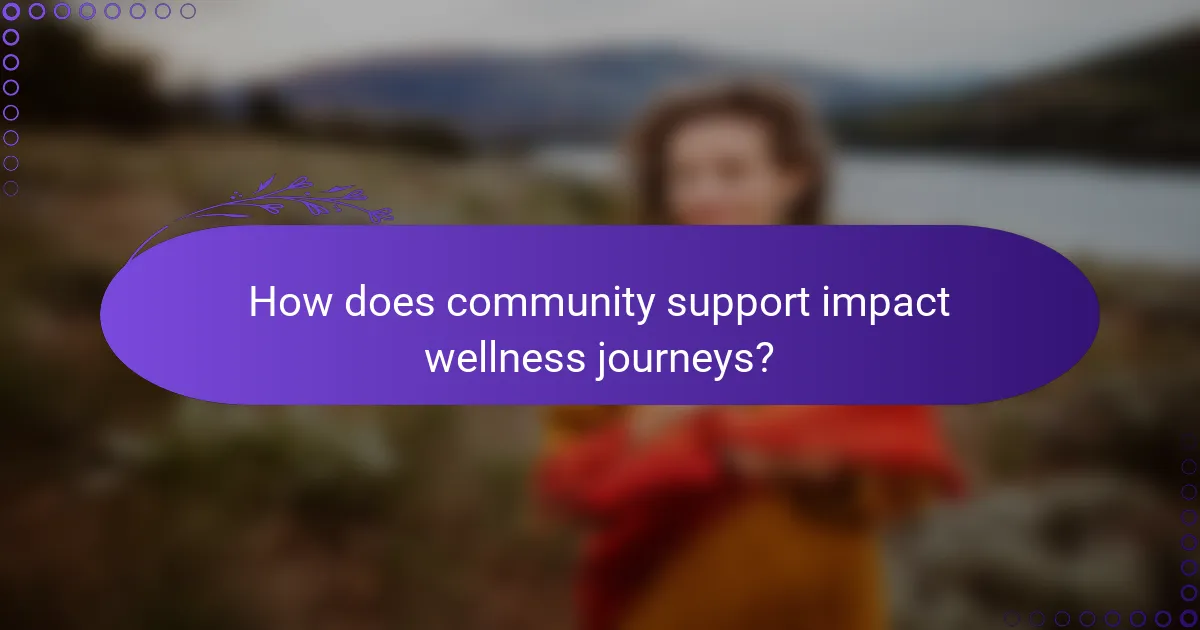
How does community support impact wellness journeys?
Community support significantly enhances wellness journeys by providing emotional backing, motivation, and access to resources. Engaging with a supportive network can lead to improved mental health, increased commitment to personal goals, and shared knowledge that fosters growth.
Enhanced emotional resilience
Community support strengthens emotional resilience by creating a safe space for individuals to express their feelings and experiences. Sharing struggles with others can normalize challenges, reducing feelings of isolation and promoting a sense of belonging.
For example, participating in group therapy or support groups allows members to learn coping strategies from one another, which can be more effective than facing difficulties alone. This collective experience can help individuals bounce back more quickly from setbacks.
Increased motivation and accountability
Being part of a community can significantly boost motivation and accountability in wellness journeys. When individuals share their goals with others, they are more likely to stay committed and push through obstacles.
For instance, joining a fitness class or a wellness challenge can create a sense of competition and camaraderie, encouraging participants to achieve their objectives. Regular check-ins with peers can also help maintain focus and track progress.
Access to shared resources
Communities often provide access to shared resources that can enhance wellness journeys. These resources may include workshops, educational materials, or even financial support for health-related activities.
For example, local wellness organizations might offer free classes, nutritional advice, or mental health services, making it easier for individuals to access the help they need. Leveraging these resources can lead to more informed choices and better overall health outcomes.
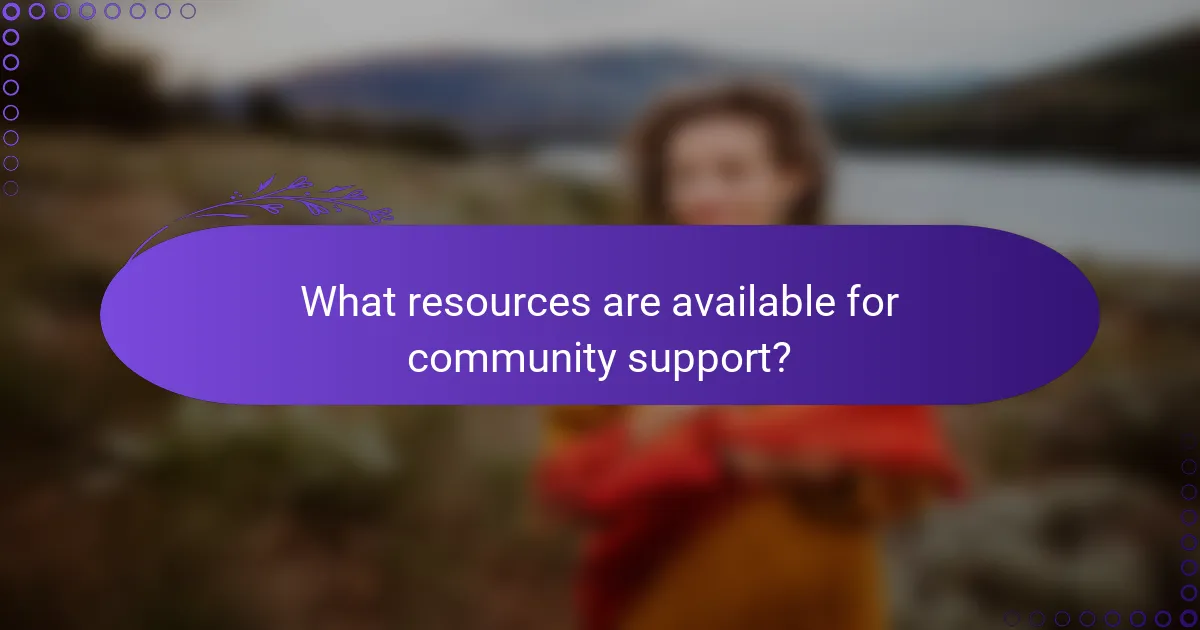
What resources are available for community support?
Community support resources include local wellness groups, online support forums, and community health programs. These resources provide individuals with access to information, encouragement, and practical assistance on their wellness journeys.
Local wellness groups
Local wellness groups are often organized around specific health topics or activities, such as fitness, nutrition, or mental health. These groups typically meet regularly, providing a space for members to share experiences, offer support, and participate in group activities.
Joining a local wellness group can enhance motivation and accountability. Look for groups in community centers, gyms, or through local health organizations. Many groups are free or charge a nominal fee, making them accessible to a wide audience.
Online support forums
Online support forums offer a platform for individuals to connect with others facing similar challenges, regardless of geographical location. These forums can be found on social media, dedicated health websites, or community platforms.
Engaging in online discussions can provide emotional support and practical advice. When participating, ensure to choose reputable forums and be cautious about sharing personal information. Many forums are moderated, which helps maintain a respectful environment.
Community health programs
Community health programs are initiatives designed to promote wellness through education, resources, and services. These programs may include workshops, health screenings, and fitness classes, often provided by local health departments or non-profit organizations.
To find community health programs, check with local health departments or community centers. Many programs are subsidized or free, making them an excellent resource for those looking to improve their health without significant financial investment.
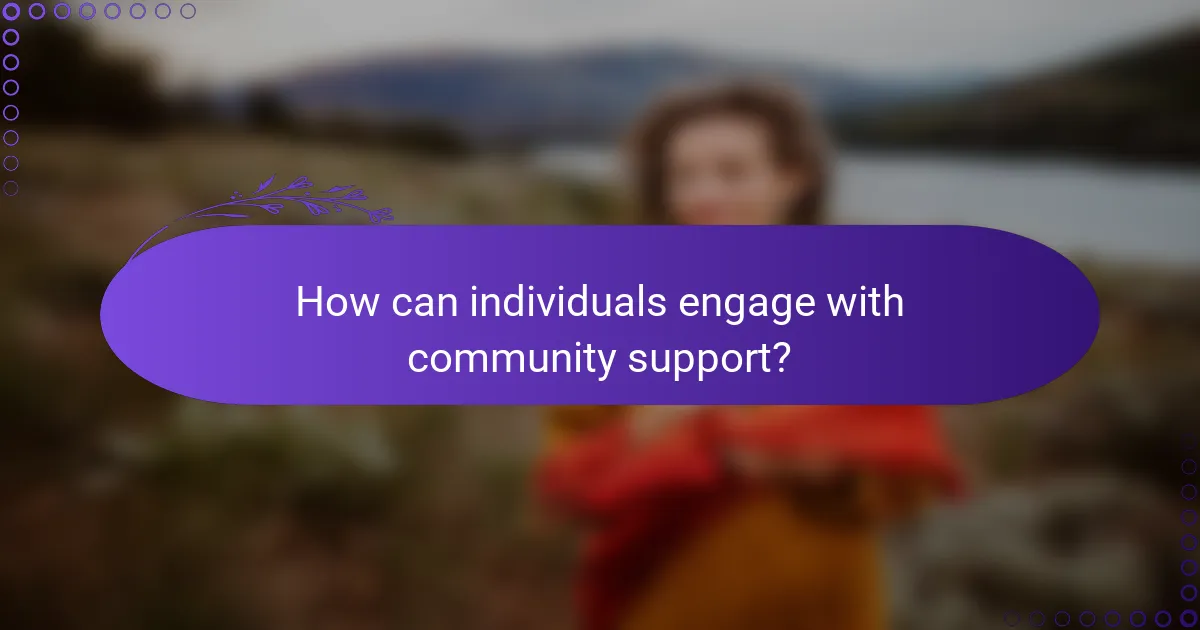
How can individuals engage with community support?
Individuals can engage with community support by actively participating in local initiatives, joining groups that focus on wellness, and volunteering for programs that promote health. These actions foster connections, provide resources, and enhance overall well-being.
Participating in local events
Engaging in local events is a practical way to connect with others who share similar wellness goals. These events can include health fairs, workshops, or fitness classes, often organized by community centers or local health organizations.
Consider attending events that align with your interests, such as yoga sessions or nutrition workshops. Not only do these gatherings offer valuable information, but they also create opportunities for networking and building supportive relationships.
Joining support groups
Support groups provide a safe space for individuals to share experiences and challenges related to wellness. These groups can focus on various topics, including mental health, chronic illness, or lifestyle changes, and are often facilitated by trained professionals.
To find a suitable group, look for local listings or online platforms that cater to your specific needs. Engaging regularly in these groups can lead to emotional support and practical advice, enhancing your wellness journey.
Volunteering for wellness initiatives
Volunteering for wellness initiatives allows individuals to contribute to their community while promoting health and well-being. Opportunities may include assisting at health clinics, participating in community clean-ups, or helping organize wellness events.
When considering volunteering, choose initiatives that resonate with your values and interests. This not only helps others but also provides a sense of purpose and fulfillment, which is essential for personal wellness.

What are the benefits of local community engagement in wellness?
Local community engagement in wellness fosters a supportive environment that enhances individual and collective health. By participating in community activities, individuals can experience improved well-being through social connections, mental health benefits, and exposure to diverse viewpoints.
Stronger social connections
Engaging with local communities helps build stronger social connections, which are essential for emotional support and resilience. These connections can lead to friendships, networking opportunities, and a sense of belonging, all of which contribute positively to overall wellness.
Consider joining local clubs, volunteer groups, or wellness programs to enhance your social network. Regular participation in community events can strengthen these ties and create a supportive atmosphere.
Improved mental health outcomes
Community engagement is linked to improved mental health outcomes, including reduced feelings of loneliness and anxiety. Being part of a community can provide a sense of purpose and fulfillment, which are crucial for mental well-being.
Participating in group activities, such as fitness classes or support groups, can significantly boost mood and decrease stress levels. Aim to engage in these activities regularly to maximize their mental health benefits.
Access to diverse perspectives
Engaging with a local community exposes individuals to diverse perspectives, enriching their understanding of health and wellness. This diversity can lead to innovative ideas and practices that enhance personal wellness journeys.
Attend community workshops or discussions to gain insights from different cultural and social backgrounds. Embracing these varied viewpoints can help individuals develop a more holistic approach to their health and well-being.
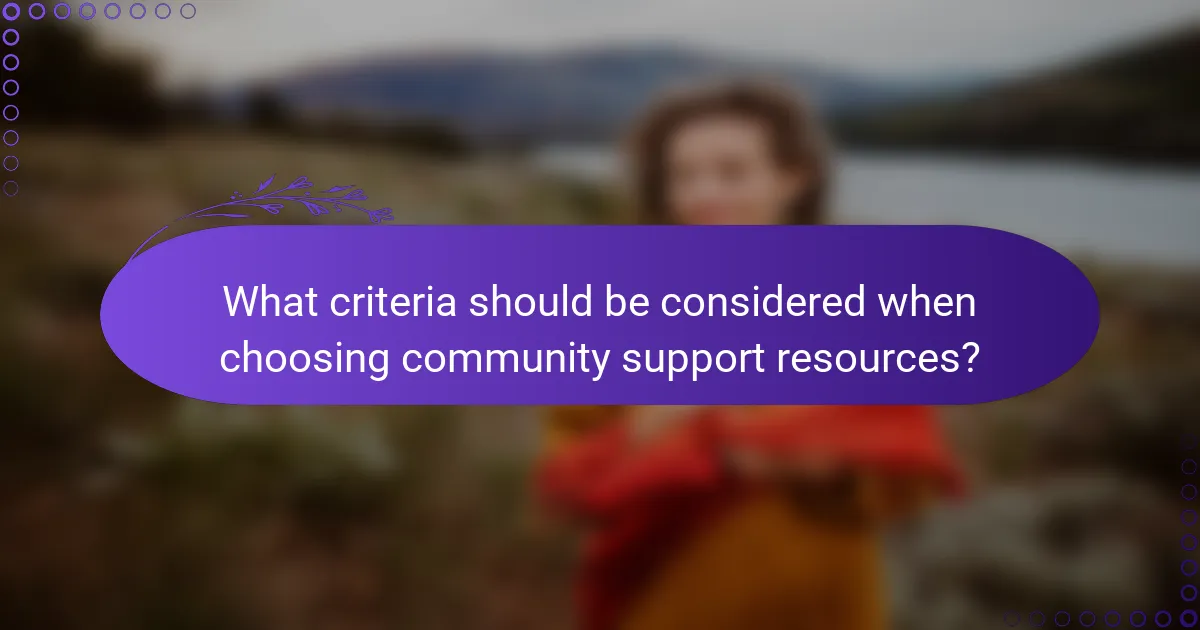
What criteria should be considered when choosing community support resources?
When selecting community support resources, consider factors such as the organization’s reputation, the accessibility of their services, and how well they align with your personal wellness goals. These criteria can significantly influence the effectiveness of the support you receive on your wellness journey.
Reputation of the organization
The reputation of a community support organization is crucial in determining its reliability and effectiveness. Look for organizations with positive reviews, testimonials, and a history of successful outcomes. Checking for accreditations or affiliations with recognized bodies can also provide insight into their credibility.
Engage with community members or online forums to gather feedback about specific organizations. This firsthand information can help you assess whether the organization is well-regarded in the community and if it meets the standards you expect.
Accessibility of services
Accessibility encompasses both physical and financial aspects of community support services. Ensure that the organization offers services that are easy to reach, whether through location, transportation options, or virtual platforms. Consider if they provide flexible hours to accommodate different schedules.
Financial accessibility is also key. Check if the organization offers sliding scale fees, accepts insurance, or provides free services. Understanding these factors can help you choose a resource that fits your budget and logistical needs.
Alignment with personal wellness goals
Choosing a community support resource that aligns with your personal wellness goals is essential for achieving meaningful progress. Identify what specific areas of wellness you want to focus on, such as mental health, physical fitness, or social connections, and seek organizations that specialize in those areas.
Evaluate the programs and services offered by the organization to ensure they match your objectives. For example, if your goal is to improve mental health, look for resources that provide counseling, support groups, or workshops tailored to mental wellness. This alignment will enhance your engagement and outcomes in the support process.
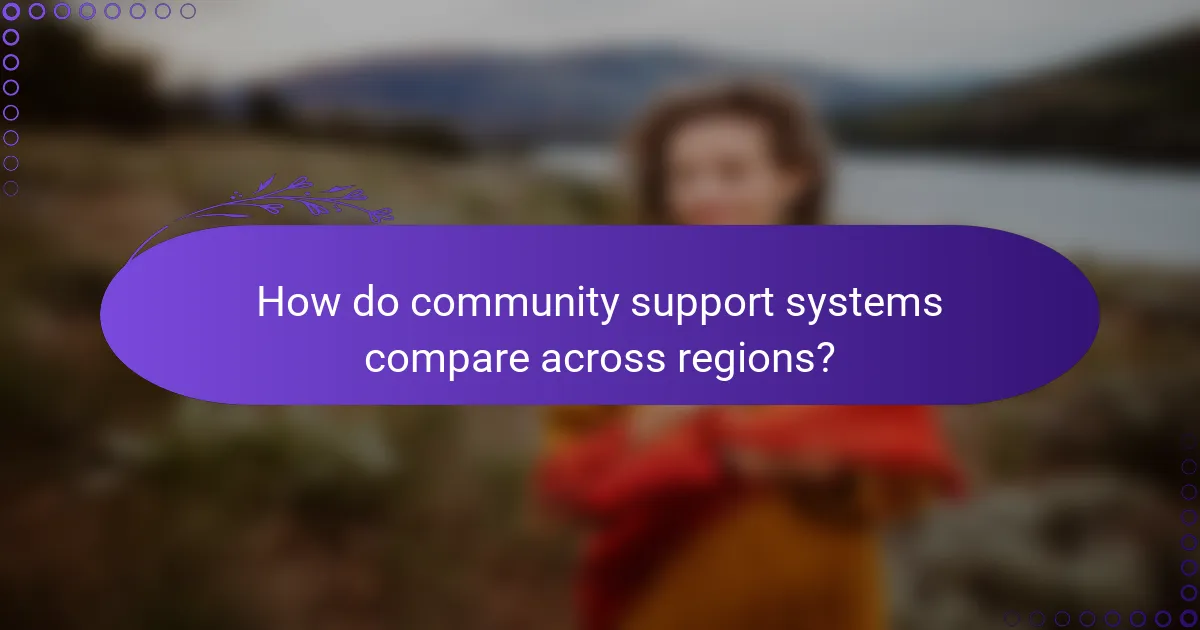
How do community support systems compare across regions?
Community support systems vary significantly across regions, influenced by local resources, engagement levels, and cultural factors. Understanding these differences is essential for individuals seeking effective support on their wellness journey.
Variations in available resources
The availability of resources for community support can differ widely between urban and rural areas, as well as among countries. Urban regions often have more access to health services, support groups, and wellness programs, while rural areas may rely on fewer, more informal networks.
For example, in the United States, larger cities typically offer a range of mental health services, community centers, and wellness workshops, while smaller towns may have limited options, often depending on local nonprofits or volunteer organizations. In Europe, countries like Sweden provide extensive public health resources, whereas others may have less comprehensive support systems.
Differences in engagement levels
Engagement levels in community support systems can vary based on cultural attitudes and the perceived stigma surrounding mental health. In some regions, individuals may be more willing to participate in community programs, while in others, there may be reluctance due to fear of judgment.
For instance, in collectivist cultures, community engagement may be higher due to a strong emphasis on social ties and mutual support. Conversely, in more individualistic societies, people might prioritize personal independence, leading to lower participation in community wellness initiatives.
Impact of local culture on support
Local culture plays a crucial role in shaping community support systems and their effectiveness. Cultural beliefs about health, wellness, and social responsibility can influence how support is structured and accessed.
In regions where mental health is openly discussed and prioritized, such as in many Scandinavian countries, community support systems tend to be more robust and widely utilized. In contrast, areas where mental health issues are stigmatized may see less community involvement and fewer resources available for those in need.


